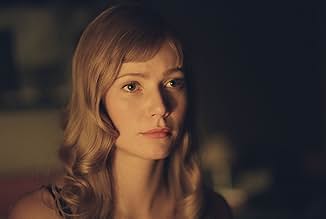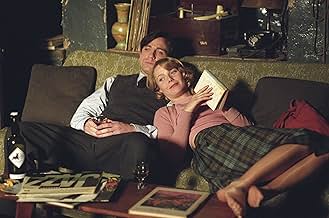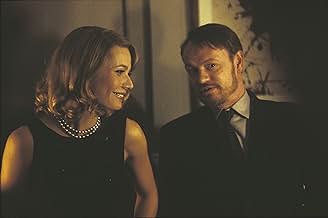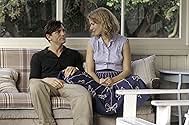IMDb रेटिंग
6.3/10
11 हज़ार
आपकी रेटिंग
अपनी भाषा में प्लॉट जोड़ेंStory of the relationship between poets Edward James "Ted" Hughes and Sylvia Plath.Story of the relationship between poets Edward James "Ted" Hughes and Sylvia Plath.Story of the relationship between poets Edward James "Ted" Hughes and Sylvia Plath.
- पुरस्कार
- कुल 1 जीत
फ़ीचर्ड समीक्षाएं
When I rented this movie, I thought it would be about Sylvia's entire life, or at least starting from her days at Smith College. I didn't realize that her marriage with Ted Hughes would be the entire storyline. I think this movie would've been better had they shown more about Plath's life BEFORE Ted Hughes. For people who don't really know much about Plath and her poetry, understanding her life before Hughes would've made the film much more substantial. The audience has to realize that Plath led a very, very hard mental life even before she met Hughes, and her ideas for her poetry and 'The Bell Jar' mostly originated from her bachelorette days. She never recovered from her depression as a young woman and it branched out still as she married Hughes. Without understanding Plath from the beginning hinders the audience from understanding Plath at all.
I feel like the movie only told half the story. Plath's mind was beautiful, colorful, and brilliant. It wasn't just about the jealousy, depression, and paranoia. Putting her works on the back burner really took away most of this movie. I would've liked to see more narration by Plath and giving us an insight into her mind, the way her unabridged journals do. However, I really enjoyed the dialogue of this movie; the lines were poetic and beautiful.
Unfortunately, I am still waiting for a better Sylvia Plath movie. I recommend people to read 'The Bell Jar' and 'Ariel' before or after seeing this movie though.
I feel like the movie only told half the story. Plath's mind was beautiful, colorful, and brilliant. It wasn't just about the jealousy, depression, and paranoia. Putting her works on the back burner really took away most of this movie. I would've liked to see more narration by Plath and giving us an insight into her mind, the way her unabridged journals do. However, I really enjoyed the dialogue of this movie; the lines were poetic and beautiful.
Unfortunately, I am still waiting for a better Sylvia Plath movie. I recommend people to read 'The Bell Jar' and 'Ariel' before or after seeing this movie though.
There is a certain type of undergraduate who sees Sylvia Plath as the victim-heroine of a period that lionized talented men but had no place for women of similar gifts, and fortunately this film does not pander to them. Poets rarely receive lavish acclaim or wealth during their lifetimes, and hers was at least equal to her talent and irrespective of her gender. Any reasonably critical reader of her autobiographical novel The Bell Jar can see evidence of serious mental illness, which in Plath's case went largely untreated, and this film chooses to focus more on that aspect of her life than on anti-feminist conspiracy theories. However, the film comes up short of fully showing Plath as the highly complex and contradictory person her contemporaries knew: sexy, seductive yet so harsh and venal in her judgments of men (especially her husband and her father) as to seem man-hating; also manipulative and vain and yet so insecure that she went long periods without writing. She was likely bi-polar and could on occasion be described as downright monstrous, yet the film hollywoodizes Plath into a more conventional 'troubled' melodrama heroine, rather than delving deeper into the brutal reality of the day-to-day life of someone with significant mental illness. This is surprising given that director Christine Jeffs' earlier film on mental illness, Rain, was unstintingly honest. Plath's well known life history is covered in straightforward biopic narrative: her close-distant, love-hate yo-yo relationship with her mother; her famous first suicide attempt and the subsequent year spent in a sanatorium that was the basis for The Bell Jar; her rocky marriage to British poet Ted Hughes that ended because of his infidelity; her prolific period as a celebrated poet and her eventual death by suicide while still young.
I should point out that I thought the cinematography and production design were wonderful. The excellent period look is established by bleeding out bright color from every scene while giving it an amber tint like old photographs. The sets were almost hyper-realistic - cluttered, dim and claustrophobic with none of the romanticized shininess that Hollywood often lavishes on period dramas.
I should point out that I thought the cinematography and production design were wonderful. The excellent period look is established by bleeding out bright color from every scene while giving it an amber tint like old photographs. The sets were almost hyper-realistic - cluttered, dim and claustrophobic with none of the romanticized shininess that Hollywood often lavishes on period dramas.
As a young woman, poetess Sylvia Plath meets the fiery Ted Hughes because of one of his poems catching her eye and deeply impressing her. So begins their life together that continues with marriage and the inevitable onset of domestication. As a woman this affects Sylvia more than it seems to affect Ted and she finds herself struggling to write as she balances home life with working as a teacher. Things are made worse by Ted, who has the first of many affairs with a student from Sylvia's class. As the pressures of family and children going to grow, so does Sylvia's mistrust of Ted and paranoia over his behaviour.
When a film is loudly disowned by the child of the subject you do have to approach it with a certain amount of caution and, although I'm not sure why Frieda Hughes took against it, I suspect it is because of the very event-based approach of this film. In a film that shows us how Sylvia was pushed down and had her talent smothered one way or another, it is ironic that the script does something similar by failing to let us understand her poetry, her character or her talent. Instead what we are treated to is a story that shows her being oppressed and beaten down. Now I accept that this is supposedly essentially true, but by ignoring her fame I imagine that this could be seen as just piling more on top of the lot she had while she was alive. It also has the effect of turning a biopic into a relationship melodrama that slowly plods along, pushing Plath down until the ending we know is coming. It is still reasonably interesting but I didn't feel that I learnt anything specific about Plath other than the fact that she was with a man that wasn't particularly good for her which puts her in the company of a lot of woman; the difference between her and them was her poetry but the film doesn't seem too bothered about this.
The upside of this is that Paltrow is best in the role when she is being downtrodden and oppressed; when she is asked to do something other than this then she seems less sure of her character and is less able at least depressed she seems to know what is required of her. Craig is as reliable as usual and does well even if his character is not exactly layered or that complex. The support is mostly pretty good, although I didn't understand what attracted Michael Gambon to such a small role, but the film pretty much belongs to Paltrow, who takes to her downtrodden well.
Overall this was an average film that plays out like a relationship melodrama and didn't do much to help me understand the character or talent of Plath other than showing me what happened within her relationship with Hughes. I can understand why her children objected to this simplification of their mother because personally I would not want to be remembered for my suffering if I had such talent. Paltrow and Craig are both good with the relationship material but the film should have been much better than it was.
When a film is loudly disowned by the child of the subject you do have to approach it with a certain amount of caution and, although I'm not sure why Frieda Hughes took against it, I suspect it is because of the very event-based approach of this film. In a film that shows us how Sylvia was pushed down and had her talent smothered one way or another, it is ironic that the script does something similar by failing to let us understand her poetry, her character or her talent. Instead what we are treated to is a story that shows her being oppressed and beaten down. Now I accept that this is supposedly essentially true, but by ignoring her fame I imagine that this could be seen as just piling more on top of the lot she had while she was alive. It also has the effect of turning a biopic into a relationship melodrama that slowly plods along, pushing Plath down until the ending we know is coming. It is still reasonably interesting but I didn't feel that I learnt anything specific about Plath other than the fact that she was with a man that wasn't particularly good for her which puts her in the company of a lot of woman; the difference between her and them was her poetry but the film doesn't seem too bothered about this.
The upside of this is that Paltrow is best in the role when she is being downtrodden and oppressed; when she is asked to do something other than this then she seems less sure of her character and is less able at least depressed she seems to know what is required of her. Craig is as reliable as usual and does well even if his character is not exactly layered or that complex. The support is mostly pretty good, although I didn't understand what attracted Michael Gambon to such a small role, but the film pretty much belongs to Paltrow, who takes to her downtrodden well.
Overall this was an average film that plays out like a relationship melodrama and didn't do much to help me understand the character or talent of Plath other than showing me what happened within her relationship with Hughes. I can understand why her children objected to this simplification of their mother because personally I would not want to be remembered for my suffering if I had such talent. Paltrow and Craig are both good with the relationship material but the film should have been much better than it was.
After viewing the film on Sylvia Plath, I felt a need to read about this poet and find out exactly what Hollywood did with it. As usual, Hollywood transformed a person's life into what an audience would want to be amused by. Mr. Hughes is personified as a womanizer and adulterer, the later of which may be true. After reading two biographies of Ms. Plath by Linda W. Wagner-Martin and Anne Stevenson and of course having studied Ms. Plath's poetry, I feel that the film, albeit entertaining does not depict her actual identity. It does a marginal account of her life, or part of her life. As any human being, Ms. Plath suffered from many demons. If you ascribe to an astrological standpoint (as Mr. and Mrs. Hughes did) you will find that Sylvia was doomed by her astrological sign, Scorpio. Those of you who are Scorpios know that there is a dark side to this sign. She set her expectations too high of most things and considered the failure of loyalty from her friends and family detrimental. Her experiences with depression only added fuel to the flame. Had she lived in modern times, maybe the newer therapies could have helped her. Depression is a severe affliction and may make a great poet, but for everyday living it can render a person helpless. It can make one helpless with dealing with marriage and children, life in general, and one's occupation. Sylvia Plath was a victim of her depression, her personality overreacting to life and her relationships. Unfortunately, she could not work her way through her inner problems and suffered the result of her mental blockage. Fortunately, for her children, they were unharmed by her mental illness and subsequent actions, and were eventually raised by their father. No one is to blame... no one is superhuman. If standards are set too high for anyone, as Sylvia set for herself, anyone is doomed to failure. We do have her poetry and novel(s) to see her inner self, which no film can properly depict.
What is it about an artist dying young - particularly if it is at his or her own hands - that strikes such a deep chord in so many of us? Is it the fact that this rare and special person achieves a kind of mastery of fate at the last moment, a perfect conclusion to this messy business of life that we mere mortals can never hope to attain? Could it be that this early death is just one more instance of an artist taking the elements of raw reality and transforming them into something stylized, transcendent and meaningful for the rest of us to brood over and contemplate? When poet and novelist Sylvia Plath committed suicide in 1963, she became the archetype of the tortured artist - particularly for sensitive young people who came to romanticize her end and her suffering in ways that lifted her and her work to iconic status.
The biopic, entitled simply 'Sylvia,' gets the 'tortured' part pretty much right, but has considerably less success with the 'artist.'
The film focuses mainly on the tumultuous relationship between Plath and her husband of eight years, famed poet Ted Hughes. The story begins in 1956 with their love-at-first-sight meeting when they were both students at Cambridge University. The film moves quickly through the years, showing how, after a short period of relative marital bliss, Ted's philandering began to take its toll on the relationship. As portrayed in the movie, Sylvia, despite her notable talent, is a mass of neuroses and insecurities, always toiling in the shadows of her (initially at least) much more well known and commercially successful husband. But her feelings of inadequacy and jealousy over Ted's infidelities cannot, in and of themselves, entirely account for her paranoia, her outbursts of anger and her suicidal tendencies. Those resulted mainly from the clinical depression that tormented the woman from the time of her father's death early in her childhood to her own tragic end. The movie sidesteps the electroshock therapy Plath underwent at various times in her life (though it very subtly hints at them), yet the film still manages to convey just how great a victim she was of this disease she could not overcome.
Thanks to John Brownlow's rather singlemindedly depressing screenplay, there's a tremendous feeling of sadness hovering over the film. Director Christine Jeffs brings a raw intensity to many of the confrontation scenes involving the pain-wracked, benighted couple. As Sylvia and Ted, Gwyneth Paltrow and Daniel Craig give rich, moving and sensitive performances, and Michael Gambon leaves his mark as a sympathetic neighbor who tries but does not succeed at saving Sylvia.
If there is a flaw in 'Sylvia,' it is one common to films that attempt to portray the lives of artists, particularly writers. Although a scenarist can dramatize the details of an artist's life, it is virtually impossible for him to capture the richness and power of the art itself in the different medium of film. We never get the sense of how Sylvia either overcomes the difficulties of her life to succeed in her writing or how she uses those difficulties to enhance her art. What we do get is a few shots of Sylvia sitting in front of a typewriter, a comment or two about a book that has been or is soon to be published, a few references to critical reviews, and a smattering of voice-over recitations of Plath's poetry. What we don't get and what it is virtually impossible for film to capture is the essence of the writing itself. For this, one needs to return to the source material, the works that have lived on after the woman herself all these years. If the movie inspires new people to explore Sylvia Plath's writing, it will not have been in vain
The biopic, entitled simply 'Sylvia,' gets the 'tortured' part pretty much right, but has considerably less success with the 'artist.'
The film focuses mainly on the tumultuous relationship between Plath and her husband of eight years, famed poet Ted Hughes. The story begins in 1956 with their love-at-first-sight meeting when they were both students at Cambridge University. The film moves quickly through the years, showing how, after a short period of relative marital bliss, Ted's philandering began to take its toll on the relationship. As portrayed in the movie, Sylvia, despite her notable talent, is a mass of neuroses and insecurities, always toiling in the shadows of her (initially at least) much more well known and commercially successful husband. But her feelings of inadequacy and jealousy over Ted's infidelities cannot, in and of themselves, entirely account for her paranoia, her outbursts of anger and her suicidal tendencies. Those resulted mainly from the clinical depression that tormented the woman from the time of her father's death early in her childhood to her own tragic end. The movie sidesteps the electroshock therapy Plath underwent at various times in her life (though it very subtly hints at them), yet the film still manages to convey just how great a victim she was of this disease she could not overcome.
Thanks to John Brownlow's rather singlemindedly depressing screenplay, there's a tremendous feeling of sadness hovering over the film. Director Christine Jeffs brings a raw intensity to many of the confrontation scenes involving the pain-wracked, benighted couple. As Sylvia and Ted, Gwyneth Paltrow and Daniel Craig give rich, moving and sensitive performances, and Michael Gambon leaves his mark as a sympathetic neighbor who tries but does not succeed at saving Sylvia.
If there is a flaw in 'Sylvia,' it is one common to films that attempt to portray the lives of artists, particularly writers. Although a scenarist can dramatize the details of an artist's life, it is virtually impossible for him to capture the richness and power of the art itself in the different medium of film. We never get the sense of how Sylvia either overcomes the difficulties of her life to succeed in her writing or how she uses those difficulties to enhance her art. What we do get is a few shots of Sylvia sitting in front of a typewriter, a comment or two about a book that has been or is soon to be published, a few references to critical reviews, and a smattering of voice-over recitations of Plath's poetry. What we don't get and what it is virtually impossible for film to capture is the essence of the writing itself. For this, one needs to return to the source material, the works that have lived on after the woman herself all these years. If the movie inspires new people to explore Sylvia Plath's writing, it will not have been in vain
क्या आपको पता है
- ट्रिवियाFrieda Hughes, Sylvia Plath's daughter and literary executor, didn't allow the producers to access to her mother's poetry. She also publicly denounced the project in a published poem of her own.
- गूफ़When Ted and Sylvia are in bed together and she is discussing her suicide attempt, you can clearly see Daniel Craig's tattoo through the make up on his shoulder and Gwyneth Paltrow's hair net to which her wig is attached.
- भाव
Sylvia: [to Ted, after making love] We're not even two people. Even before we met, we were just these two halves, walking around with big gaping holes in the shape like the other person. And when we found each other we were finally whole. And then it was as if we couldn't stand being happy so we ripped ourselves in half again.
टॉप पसंद
रेटिंग देने के लिए साइन-इन करें और वैयक्तिकृत सुझावों के लिए वॉचलिस्ट करें
- How long is Sylvia?Alexa द्वारा संचालित
विवरण
बॉक्स ऑफ़िस
- बजट
- £70,00,000(अनुमानित)
- US और कनाडा में सकल
- $13,15,498
- US और कनाडा में पहले सप्ताह में कुल कमाई
- $58,940
- 19 अक्टू॰ 2003
- दुनिया भर में सकल
- $29,17,393
- चलने की अवधि1 घंटा 50 मिनट
- रंग
- ध्वनि मिश्रण
- पक्ष अनुपात
- 2.35 : 1
इस पेज में योगदान दें
किसी बदलाव का सुझाव दें या अनुपलब्ध कॉन्टेंट जोड़ें





































